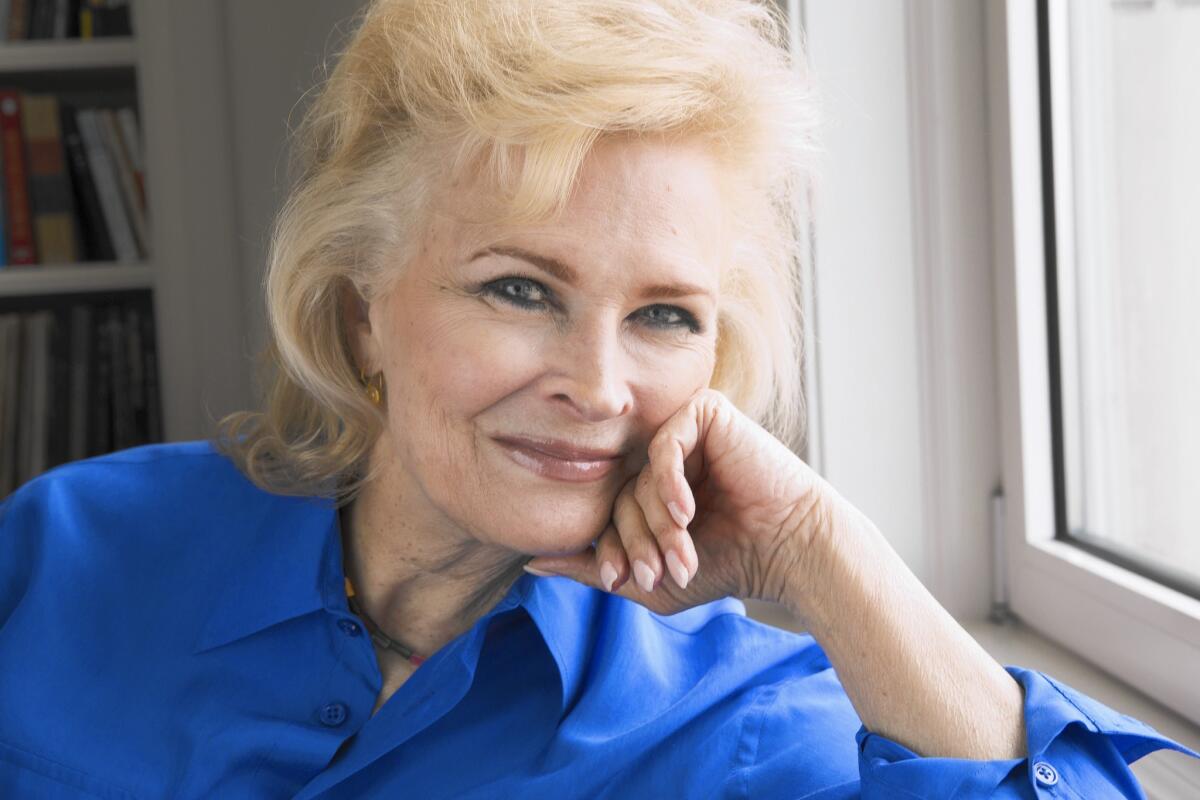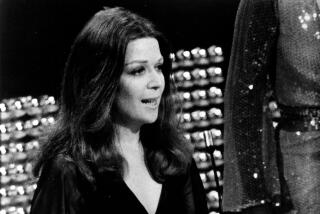Q&A: Candice Bergen offers a second memoir, ‘A Fine Romance’

- Share via
Three decades after writing her memoir “Knock Wood,” Candice Bergen has penned a follow-up, “A Fine Romance.”
The 68-year-old Emmy Award-winning daughter of ventriloquist Edgar Bergen discusses with candor, humor and poignancy her unconventional marriage to the late French film director Louis Malle, becoming a mother at age 39 to daughter Chloe, finding success on the 1988-98 CBS sitcom “Murphy Brown,” losing Malle to cancer and then finding love and marriage again with New York real-estate developer Marshall Rose.
Along the way, she deals with Chloe leaving the nest — her daughter is now the social editor for Vogue — and the vagaries of growing older, including suffering a stroke in 2006.
She’ll be in conversation April 19 with Los Angeles Times television critic Mary McNamara at the L.A. Times Festival of Books at USC. And on April 21, Bergen and “Murphy Brown” creator Diane English will be reuniting for a Writers Bloc discussion at the New Roads School in Santa Monica.
We spoke with Bergen by phone from her daughter’s apartment in New York City.
I admire that you admitted in your book, “I am fat. In the past 15 years … I have put on 30 pounds. I live to eat. None of this ‘eat to live’ stuff for me.”
Women who eat kale — it’s like, “Go away!”
It’s been 31 years since you published “Knock Wood.” Why so long a wait for the sequel?
It was something that I didn’t want to do for the reason that I didn’t want to open up a lot of things about my late husband that I knew would be very painful to go into and relive. I also feel that any kind of memoir is just a tome to narcissism. I thought if I am going to write another memoir, I think the only antidote to the narcissism of it is that you are as honest as you are capable of being.
Simon and Schuster had given me an advance on the second book. Finally, they contacted me and said, “We’d like the book.” Frankly, I didn’t have much else going on. Then I went four years over the deadline because I was just dragging my feet.
Since you were reluctant to write “A Fine Romance,” what was the experience like once you started? Was it cathartic?
I think so. I also think that it should in a way be required homework for people, because you are excavating your life and sort of examining it and taking responsibility. I think it’s healthy in a way and sort of puts some distance between things that might need distance. It can be helpful for people to review their lives and confront their behavior. You realized that you did the best you could at the time.
What comes through in “A Fine Romance” is how grounded you are and how you wanted that for your daughter.
I think that staying grounded and keeping my daughter grounded was very important. My daughter only came to the “Murphy Brown” set three times and still to this day has barely seen the show. My father was quite famous when I was a child, so the sense of entitlement can be overwhelming. It doesn’t make for a healthy child, and keeping myself free from the sense of entitlement as I got older was important.
But it wasn’t easy for you to juggle your marriage, motherhood and “Murphy Brown.” Louis lived in Paris and would come to L.A. to visit, but you didn’t really get to spend a lot of time together as a family until your summer hiatus.
I think it is very hard to have it all and what paid the price was my marriage. “Murphy Brown” was not only a job with a salary, but it was a fixed job. So living in the city where my mother and my brother lived gave Chloe a sense of family and a sense of structure. The big problem was that my husband wanted us to move to France, and I wanted to move back to L.A. He missed his hometown, and I missed mine. That was very hard on him, certainly because he bore the brunt of the traveling.
Of course, in Paris, she would have had her French family, which in my husband’s case was vast. On the other hand, she wouldn’t have had the American sense of humor, and to me that matters.
I remember seeing you and Louis at an opening night at a play in Los Angeles, and it was lovely just seeing how in sync you were as a couple and how you looked at each other.
We loved each other. We had a wonderful time together. He was extremely brilliant. He knew everything about everything. He had this rampaging curiosity. He loved America. He loved American sports. It was thrilling to talk with him in bed at night about things.
And your memories of his illness and death from cancer and how he and Chloe bonded during that time were so touching. You were taking care of him while you were doing “Murphy Brown.”
People thought there was something vaguely heroic about my continuing to work. It kept me sane.
Were you surprised when the “Murphy Brown” pregnancy was turned into a political hot potato in 1992 by Vice President Dan Quayle, who said that Murphy opting for single motherhood was “ignoring the importance of fathers”?
I had some idea [it would] because I have a close friend and he called me and said, “You better be careful. You are going to send a message that can be very dangerous to young women who don’t know better and who don’t have the advantages and means of your target audience.” Of course, I thought he was exaggerating, but he was right as usual.
It was just the vanguard of what was happening socially. Women were starting to have children as single mothers. They were women who had to do it because they didn’t find a relationship that they wanted to be in and didn’t want to miss having children.
You and Marshall Rose have been married 15 years now. It’s a totally different marriage. You and Louis were separated for months at a time, but Marshall is very much a home body.
He is the most attentive husband. He’s kind and intelligent. He used to carry a briefcase. I just though that was the most exotic thing I had ever seen. A guy carrying a box off to work. He just thinks that me and all of my friends are some place deeply crazy. He has given up trying to make sense out of us.
Follow Classic Hollywood on Facebook
More to Read
The complete guide to home viewing
Get Screen Gab for everything about the TV shows and streaming movies everyone’s talking about.
You may occasionally receive promotional content from the Los Angeles Times.







